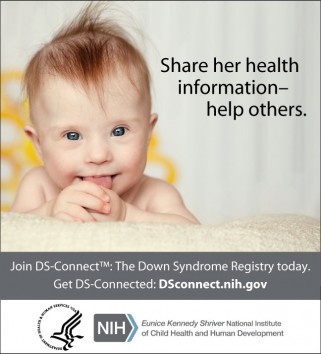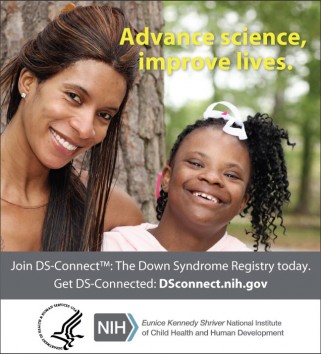NIH DS-Connect registry unites Down syndrome community
DS-Connect promises a path to research breakthroughs. If you are a parent or a guardian, help your loved one with Down syndrome and sign up now.
Sign up for DS-Connect today!
DS-Connect™: The Down Syndrome Registry is a vital new resource for people with Down syndrome, giving thousands of individuals access to a community of researchers working to improve their health and well-being.
Launched by the National Institutes of Health (NIH), the registry was first conceived in 2007 as part of the NIH’s 10-year Research Plan on Down Syndrome. Now that it has launched, DS-Connect provides a way for individuals with Down syndrome and their families to learn about, and take part in, research studies focused on related conditions such as developmental delays and congenital heart defects.
Global Down Syndrome Foundation helps lay the groundwork
 The registry began to take shape in December 2010, when Global and the Eunice Kennedy Shriver National Institute of Child Health and Human Development (NICHD) at the NIH co-hosted the first “Down Syndrome: National Conference on Patient Registries, Research Databases and Biobanks.”
The registry began to take shape in December 2010, when Global and the Eunice Kennedy Shriver National Institute of Child Health and Human Development (NICHD) at the NIH co-hosted the first “Down Syndrome: National Conference on Patient Registries, Research Databases and Biobanks.”
During that meeting, 70 representatives from Global, the Linda Crnic Institute for Down Syndrome, NICHD, NIH, the Centers for Disease Control and Prevention, and other non-governmental organizations met to discuss the issues and implications of creating a such patient database.
“We wanted to create tools that would facilitate research for Down syndrome,” said Melissa Parisi, M.D., Ph.D., Chief of the Intellectual and Developmental Disabilities Branch at the NICHD. “NIH and Global worked together to identify leaders in the Down syndrome community who could help with next steps in the creation of the registry.”
The conference addressed a number of crucial issues related to the creation of an online patient database, including confidentiality concerns and short-, mid- and long-term goals. The launch of the registry is the ultimate successful outcome, and thus far, over 2,000 individuals with Down syndrome have registered.
Elevating Down syndrome research to new heights

Dr. Melissa Parisi
“This is the first time the Down syndrome community has had a resource that involves active participation in medical research,” Dr. Parisi said. “DS-Connect is designed to connect them with scientists working to better understand the condition and develop treatments that will help improve their quality of life.”
People with Down syndrome are living longer now than ever before, so it has become crucial to understand the health problems within the community and how to best treat those problems.
The secure, confidential database does more than link researchers with potential study subjects, however. Families are able to access lists of specialists, such as healthcare providers with experience treating children with Down syndrome, as well as educational resources that enable them to learn more about various conditions, such as Alzheimer’s.
“This is an opportunity for these families to learn about Down syndrome, not only for their own child, but also for the broader community,” Dr. Parisi said. “But it’s also about the research community giving back.”
Recent Posts
- GLOBAL LEADERS – An Exclusive Interview with Erin Suelmann, Executive Director of the Down Syndrome Association of Greater St. Louis
- Sleep Apnea Across the Lifespan in People with Down Syndrome
- Government Profiles: Robert Aderholt (R-AL) & Tammy Baldwin (D-WI)
- Connor Long & Josh Peck: A GLOBAL Bromance
- GLOBAL Launches Pilot Fitness Program using Mann Method PT


 Experience our inspirational and groundbreaking videos and photos. Our children and self-advocates are beautiful AND brilliant!
Experience our inspirational and groundbreaking videos and photos. Our children and self-advocates are beautiful AND brilliant! Make sure your local Representatives are on the Congressional Down Syndrome Task Force.
Make sure your local Representatives are on the Congressional Down Syndrome Task Force.